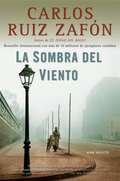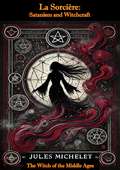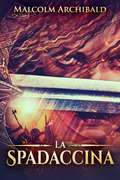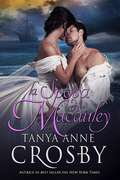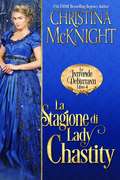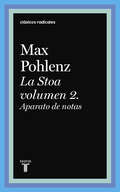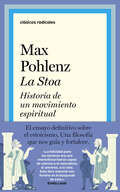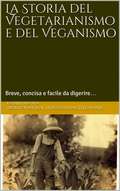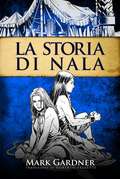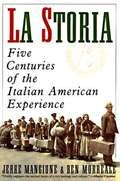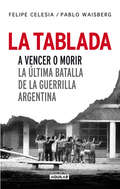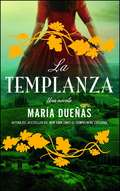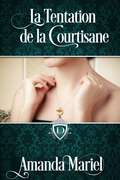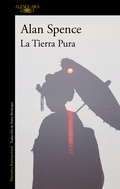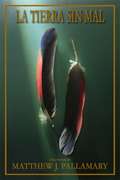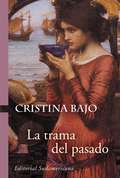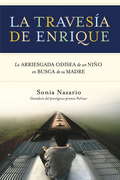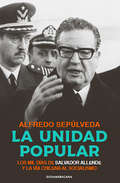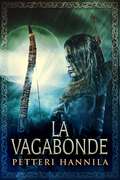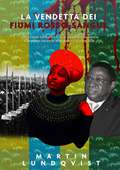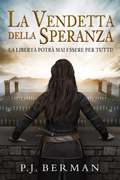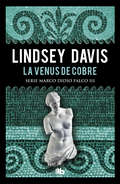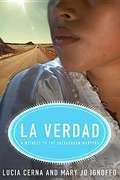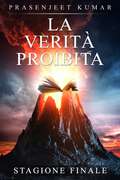- Table View
- List View
La Sombra del Viento: La Sombra Del Viento
by Carlos Ruiz ZafónUn amanecer de 1945, un muchacho es conducido por su padre a un misterioso lugar oculto en el corazón de la ciudad vieja: el Cementerio de los Libros Olvidados. Allí encuentra La Sombra del Viento, un libro maldito que cambiará el rumbo de su vida y le arrastrará a un laberinto de intrigas y secretos enterrados en el alma oscura de la ciudad. Ambientada en la enigmática Barcelona de principios del siglo XX, este misterio literario mezcla técnicas de relato de intriga, de novela histórica y de comedia de costumbres, pero es, sobre todo, una tragedia histórica de amor cuyo eco se proyecta a través del tiempo. Con gran fuerza narrativa, el autor entrelaza tramas y enigmas a modo de muñecas rusas en un inolvidable relato sobre los secretos del corazón y el embrujo de los libros, manteniendo la intriga hasta la última página.
La Sorcière: Satanism And Witchcraft - The Witch Of The Middle Ages
by Jules MicheletLa Sorcière: Satanism and Witchcraft - The Witch of the Middle Ages by Jules Michelet is a captivating and provocative exploration of the history of witchcraft, the persecution of witches, and the complex societal forces that shaped the witch hunts of the Middle Ages. Originally published in 1862, this groundbreaking work by the renowned French historian offers a unique blend of historical analysis, social commentary, and romanticism, painting a vivid picture of the witch as both victim and rebel.Michelet's La Sorcière delves into the dark and often tragic lives of women accused of witchcraft, examining how these women, often healers, midwives, and wise women, became targets of fear and hatred in a patriarchal society. He portrays the witch as a symbol of resistance against the oppressive structures of the medieval Church and feudal society, a figure who embraced forbidden knowledge and ancient, pagan practices that challenged the established order.Through his lyrical and passionate prose, Michelet presents the witch not only as a tragic victim of persecution but also as a misunderstood and powerful embodiment of female strength, knowledge, and defiance. He explores the witch’s connection to nature, her role in local communities, and the complex relationships between witchcraft, heresy, and Satanism.La Sorcière is more than just a historical study; it is a deeply humanistic and empathetic portrayal of those who suffered under the brutal weight of superstition and religious zealotry. Michelet’s work has influenced generations of historians, feminists, and scholars of the occult, offering a powerful critique of the social and religious forces that fueled the witch hunts.This book is an essential read for anyone interested in the history of witchcraft, the social dynamics of the Middle Ages, and the enduring cultural legacy of the witch. La Sorcière continues to resonate with modern readers, providing a compelling and insightful look into the dark chapters of history and the resilience of those who lived through them.
La Spadaccina
by Malcolm ArchibaldI Norreni pensavano di poter conquistare la Scozia. Si sbagliavano. Melcorka è un'ordinaria giovane donna delle Isole. Ma quando la sua terra natia, Alba, viene attaccata da un'orda vichinga, Melcorka abbandona la sua vita agiata ed intraprende il cammino della guerriera. Con una sgangherata banda di compagni, si dirige a sud per riunire i clan e liberare la terra dal flagello degli Uomini del Nord - e rivendicare il proprio destino.
La Sposa di MacAuley
by Tanya Anne Crosby Ernesto PavanL'ereditiera di Boston Sophia Vanderwahl è venuta a conoscenza del fatto che il suo fidanzato è un disgustoso donnaiolo. Bramosa di vendetta, decide di raggiungere il fedifrago in Messico per restituirgli l'anello di fidanzamento, ingaggiando a tale scopo un vecchio rivale dell'uomo. Pur sospettando delle motivazioni di Sophie, Jack MacAuley ha bisogno del denaro per finanziare la propria spedizione. Nel corso di questa romantica e non troppo seria storia di navigazione, Jack e Sophie impareranno a fidarsi l'uno dell'altra, tanto in amore quanto in amicizia.
La Stagione di Lady Chastity (Le Intrepide Debuttanti #4)
by Christina McKnightPer anni, Lady Chastity Neville è rimasta all’ombra della sua austera sorella maggiore. Ma mentre l’intellettuale Prudence può anche essere contenta di trascorrere le sue ore da sola con un libro, Chastity sogna segretamente di scrollarsi di dosso i suoi modi di fare da introversa. Quando trova una vecchia lettera che suggerisce che la madre possa aver avuto un passato scandaloso, Chastity si sente attratta dal mistero della donna che non ha mai conosciuto. Questo Natale, è determinata a scoprire la verità - e a dare vita al suo scandalo personale. Bastian Stanhope, conte di Mansfield, ha vissuto la sua vita in base ai desideri degli altri. Occuparsi della madre malata è la sua responsabilità principale. Ma quando incontra Lady Chastity, è attratto dalla sua compassione e dal suo spirito d’avventura. Per la prima volta pensa al proprio futuro. È la stagione delle marachelle festose perciò, per conquistare il cuore di Chastity, dovrà essere un po’ malizioso. E con qualche bacio sotto il vischio, la missione scandalosa di Chastity potrebbe trasformarsi nell’amore di una vita…
La Stoa volumen 2. Aparato de notas
by Max PohlenzUn complemento para quienes quieren profundizar en la obra La Stoa, de Max Pohlenz. Tradicionalmente, las sucesivas ediciones en alemán de La Stoa, de Max Pohlenz, se han publicado en dos volúmenes, uno dedicado al texto general y otro exclusivamente dedicado al amplio aparato de notas. La edición publicada en papel en Taurus (la primera que se publica en castellano) corresponde al primero, pero este ebook de acceso gratuito pone las notas (es decir, el segundo volumen) a disposición de cualquier lectora. Asimismo, el aparato de notas está disponible en la versión digital del libro completo.
La Stoa: Historia de un movimiento espiritual
by Max PohlenzEl ensayo definitivo sobre el estoicismo, una filosofía que nos guía y fortalece. Este libro, nunca antes traducido al castellano, es la síntesis más completa del estoicismo, ese grandioso movimiento filosófico y espiritual nacido en Grecia que, con sus ideales de perfección moral y con su poderoso mensaje sobre el destino del ser humano en el cosmos, conquistó la cultura antigua, con particular éxito a Roma, y ejerció una gran influencia no solo en las corrientes filosóficas y religiosas de la Antigüedad tardía sino también en la Edad Moderna. La crítica ha dicho:«La felicidad para los estoicos era una maravillosa fuerza capaz de unirnos a la naturaleza, al universo, a la vida. Este libro esencial nos ilumina en la búsqueda de esta.»Emilio Lledó
La Storia del Vegetarianismo e del Veganismo: Breve, concisa e facile da digerire…
by Daniel HagenMa prima di tutto: La lettura di questo libro sulla storia del Vegetarianesimo e Veganismo non è per soli apostoli e portavoce del cavolo rapa! È degno di lettura, infatti, anche per i feticisti della bistecca. Immergiti insieme a noi nella storia del Vegetarianismo e Veganismo che risulterà tutto meno che stoppacciosa né tantomeno fibrosa! Soprattutto, perché nel primo volume della collana AondaFood, la storia dell’alimentazione a base di prodotti dell’orto non viene masticata ed elaborata come in un'enciclopedia. In questa breve guida attraverso la storia della dieta vegana e vegetariana, verranno descritte le fasi più salienti in maniera breve, concisa e semplice da digerire. Ah, quasi dimenticavo! Queste righe sono state scritte non da un vegano purosangue ma da un autoproclamato “Scimpanzè”, che ovviamente non si ciba di scimmie, ma che come i nostri parenti del mondo animale ha deciso prevalentemente di nutrirsi di alimenti vegetali, godendosi talvolta il gusto di una fettina di carne. Tuttavia il tutto è stato passato sotto l’occhio di falco di una nutrizionista vegana certificata…nulla può dunque andare storto. Vi auguriamo un buon divertimento durante la lettura!
La Storia di Nala
by Mark Gardner RobertoNala e sua sorella vivono le loro vite da schiave sotto la Dinastia Han. Un incontro casuale in un bazar porta Nala a compiere una missione per tenere al sicuro dal male sua sorella, mentre lei impara che non tutto è come sembra. Riuscirà a salvare la sorella, e se stessa, prima che sia troppo tardi?
La Storia: Five Centuries Of The Italian American Experience
by Jerre Mangione Ben MorrealeFrom the early Italian adventurers who played an important role in the European expansion across the Atlantic to the political and business leaders of the 1990s, this book tells a dramatic story. The heart of the story is the mass migration that took place between 1880 and 1924, when a whole culture left its ancient roots to settle in the cities and towns of America.
La Tablada: A vencer o morir. La última batalla de la guerrilla argentina
by Pablo Waisberg Felipe CelesiaLa Tablada echa luz sobre lo oscuro. Son páginas apasionadas y apasionantes que intentan explicar a una Argentina inexplicable. En el amanecer del lunes 23 de enero de 1989, un camión embiste contra el portón de acceso del Regimiento de Infantería Mecanizado 3, en la localidad bonaerense de La Tablada. Tras él, ingresa una caravana de vehículos. Sus ocupantes, al grito de "¡Viva Rico! Viva Seineldín!", se proponen copar la unidad militar. En el transcurso de las horas, el aparente alzamiento militar "carapintada" -uno más de los varios que ya ha sufrido el gobierno de Raúl Alfonsín- mostrará ser en realidad una operación planeada y ejecutada por dirigentes y militantes del Movimiento Todos por la Patria (MTP). Los enfrentamientos dejarán un grave saldo de muertos, heridos y desaparecidos, y repercusiones políticas de larga duración. Los debates en torno a sus motivaciones y entretelones perduran hasta hoy. La Tablada es el relato vívido de los cruentos combates, de la recuperación del cuartel y del juicio y los años de prisión de los atacantes. Pero también es una historia del MTP, de sus debates internos y rupturas, de sus relaciones con la prensa y conotros sectores políticos. Los periodistas Felipe Celesia y Pablo Waisberg construyen una narración ágil, sostenida por una investigación minuciosa que incluye informes inéditos hasta hoy y permite comprender ese controvertido episodio y también uno de los momentos más conflictivos del primer gobierno democrático tras largos años de dictadura.
La Templanza: Una Novela (Atria Espanol)
by Maria DuenasLa autora bestseller de El Tiempo Entre Costuras, María Dueñas nos regala una novela brillante, un tributo a las segundas oportunidades y al poder irrefrenable del amor.Nada hacía suponer a Mauro Larrea que la fortuna que había levantado tras años de tesón y arrojo se la derrumbaría con un estrepitoso revés. Ahogado por las deudas y la incertidumbre, apuesta sus últimos recursos en una temeraria jugada que abre ante el la oportunidad de resurgir. Hasta que la perturbadora Soledad Montalvo, esposa de un comerciante de vinos londinense, entra en su vida para arrasarlo a un destino que jamás sospecho. De la joven república mexicana a la Habana colonial; de las Antillas al Jerez de la segunda mitad del siglo XIX, cuando el comercio de vinos con Inglaterra convirtió la ciudad andaluza en un enclave cosmopolita y legendario. Por todos estos escenarios transita La Templanza, una novela que habla de glorias y derrotas, de minas de plata intrigas de familia, vinas, bodegas y ciudades soberbias cuyo esplendor se desvaneció en el tiempo. Una historia de coraje ante las adversidades y de un destino alterado para siempre por la fuerza de una pasión.
La Tentation de la Courtisane (FICTION / Romance / Historique / Victorien #1)
by Amanda MarielOseront-ils s'accrocher l'un à l'autre et se battre pour l'avenir dont ils rêvent ? Après le décès de la mère de Tabetha Barkley, elle se retrouve presque démunie et sans expérience de travail. À court d'options, Tabetha rend visite à la duchesse du Devon pour réclamer une vieille faveur due à sa mère. Maintenant, Tabetha doit être une femme de ménage dans la maison du Devon. Il semble que ses problèmes soient résolus. Jusqu'à ce qu'un beau valet de pied commence à jouer avec son cœur et à mettre en danger ses plans. Thomas Kingston sert fièrement la maison du duc du Devon, sans jamais rêver de plus, jusqu'à ce que Mademoiselle Tabetha Barkley se présente dans le salon de la Duchesse. Maintenant, il se retrouve frappé et souhaite un avenir différent. Celui où il peut à la fois servir le duc et épouser Tabetha. Dommage que les valets de pied n'aient pas droit à de telles libertés. Tabetha et Thomas s'apprécient de plus en plus chaque jour. Très vite, leurs cœurs sont engagés, mais les circonstances exigent qu'ils restent sans attaches. Oseront-ils s'accrocher l'un à l'autre et se battre pour l'avenir dont ils rêvent ?
La Tierra Pura
by Alan SpenceEn el amor y en la batalla se forja el alma de un samurái. Una moderna novela épica. En 1858, Thomas Glover, un joven aventurero escocés, acepta un empleo de mercader en Japón. En los siguientes diez años amasa una gran fortuna, aprende las tradiciones de los samuráis y colabora en la destitución del Sogún. Sin embargo, tras el éxito se esconde un hombre que no es feliz. Su historia de amor con una cortesana quedaría inmortalizada en la famosa ópera Madama Butterfly. Una moderna novela épica, un inolvidable viaje del espíritu, La Tierra Pura recrea la trayectoria de la auténtica ascensión y declive de la vida de Glover y describe una saga de cien años que culmina con la destrucción de Nagasaki en 1945. La crítica ha dicho...«Un libro que atrapa al lector desde el principio. No es solamente una irresistible y cuidada novela histórica, sino también una obra de arte reflexiva tan bien afilada como la espada de un samurái.»The Times «Alan Spence es un visionario.»Ali Smith «Un estilo refinado y una sutileza admirables... Sobresaliente, engancha desde el principio y deja una huella perdurable en la memoria... Una novela de increíble ambición, aliento y profundidad. Un moderno relato épico hermosamente escrito.»Irish Independent «Una vida extraordinaria narrada con un estilo fascinante.»Nottingham Evening Post «Un libro que tiene ingredientes de sobra para convertirse en un moderno clásico de aventuras.»The Fraserburgh Herald «Una narración desgarradora, una historia llena de aventuras y valor.»Independent on Sunday «Una historia épica, ambiciosa y humana que habla de vida, amor y valientes hazañas.»The List
La Tierra Sin Mal
by Rosina Iglesias Matthew J. PallamaryViaje de 250 años al pasado hacia un mundo donde la naturaleza habla a través de las plantas y los cánticos fluyen de las cataratas de forma tan sobrecogedora como el coro de la iglesia cantando el Ave María. Un lugar donde se cree que el ritmo de una maraca con plumas te acerca al creador. Un mundo donde el misticismo y la espiritualidad innata entran en conflicto con el cristianismo. Avá-Tapé, criado en las tradiciones de los indios guaraníes de Sudamérica y, posteriormente, educado en la Misión por los jesuitas, descubre la verdad y belleza de ambos mundos, aunque solo puede vivir en uno. Chamanismo, intolerancia religiosa, historia, imperialismo, entrada en la mayoría de edad y una conmovedora historia de amor impulsan esta narración incisiva, que invita a la reflexión del legado de un pueblo indígena y sus tradiciones. Con un lenguaje que captura tanto la esencia como el espíritu de la cultura guaraní, Pallamary traslada a sus lectores a un mundo hace tiempo olvidado que merece la pena explorar, a una espiritualidad que trasciende el dogma religioso e inspira comprensión y esperanza. Con ambientación realista e interpretación atemporal de la condición humana, “La Tierra Sin Mal” es una celebración victoriosa del espíritu humano. "Tierra sin mal, es una lectura interesante y profunda para los que deseen saber más sobre el conflicto y las verdades del pasado y presente de un pueblo que no se resiste. Los guaraníes con esta historia salen reforzados para ese futuro no exento de riesgos, pero también esperanzador. Gracias." Miren E. Palacios, escritora y poeta, autor de, Escalera de Damas, Toma mi mano, y Más allá del interior". "Si le gustó la película “La Misión” de Roland Joffé, volverá a emocionarse con esta historia, contada desde el punto de vista de los guaraníes. Un pueblo ancestral y mágico a la búsqueda del paraíso perdido. Una obra que emociona y enfurece.
La Trama del Pasado
by Cristina Bajo1840, Vigo, Galicia. Una joven aristócrata, Ignacia Arias de Ulloa, abandona a su marido y huye con una criada llevándose muy poco: su estuche de esgrima, y el halcón preferido de él. Al llegar a la casa solariega de su madre se encuentra con que ésta, viuda y nacida en las provincias del Río de la Plata, ha decidido regresar a su tierra para ajustar viejas cuentas. Sin pensarlo, Ignacia se embarca con ella. Mientras el país se desangra en la guerra civil que en la primera mitad del siglo XIX asoló a la Argentina, desde la Córdoba americana don Fernando Osorio y Luna, descendiente de un antiguo linaje, emprende con sus hombres un viaje a caballo hacia Buenos Aires, con un mensaje secreto para don Juan Manuel de Rosas, jefe del partido federal. A mitad de camino, y en una de las batallas más cruentas de la historia argentina, Ignacia y él se encontrarán, sin saber que sus lazos provienen del pasado, de trágicos misterios familiares que, desde los orígenes de su estirpe, parecen alcanzarlos como una maldición. Asechado por enemigos desconocidos que atacan salvajemente a su mujer y a su hijo, involucrado en venganzas y reencuentros, amenazado con la expropiación de sus tierras, Fernando encontrará que la mayoría de los privilegios que los suyos mantuvieron por siglos han desaparecido; que los Osorio han caído en desgracia, y que aquella joven del halcón, Ignacia, pertenece al círculo de los enemigos de su familia. Puede un hombre de acción como él, valiente, fiel a sus ideas y a su gente, permanecer indiferente ante la matanza y las injusticias a que todos los días se ve sometida su ciudad por aquellos que se decían sus aliados? En esta nueva entrega de la saga de los Osorio, no será una mujer de la familia la protagonista sino un hombre: Fernando, el Payo, hermano de Luz y primo de Laura. Junto a él, personajes históricos y ficcionales desentrañarán una trama tejida con sangre, secretos y ausencias: La trama del pasado, una novela vibrante, estremecedora, que confirma una vez más el talento narrativo y la pluma avezada y mágica de Cristina
La Travesia de Enrique
by Sonia NazarioEn esta asombrosa historia real, la galardonada periodista Sonia Nazario relata la inolvidable odisea de un niño hondureño que enfrenta penurias y peligros para reunirse con su madre en los Estados Unidos. Cuando Enrique tiene cinco años, su madre, Lourdes, se marcha de Honduras para trabajar en los Estados Unidos. Esto le permite enviarle dinero a Enrique para que pueda comer mejor y asistir a la escuela más allá del tercer grado. Lourdes le promete a su hijo que regresará pronto, pero en los Estados Unidos las cosas no son fáciles. Transcurren once años. A Enrique lo desespera pensar que no volverá a ver a su madre, y se lanza solo en su busca desde Tegucigalpa con poco más que un pedazo de papel donde ha escrito el número telefónico de su madre en Carolina del Norte. Sin dinero, hará una travesía peligrosa e ilegal a lo largo de México de la única forma que puede: encaramado en los costados y en los techos de los trenes de carga. Con recia determinación y profundo anhelo, Enrique atraviesa mundos hostiles y desconocidos eludiendo pandilleros que controlan los techos de los trenes, bandidos despiadados y policías corruptos que sólo quieren robarle lo que tiene y deportarlo. Enrique avanza a fuerza de ingenio, coraje, y esperanza-y también gracias a la bondad de los desconocidos. Es una travesía épica que hacen miles de niños inmigrantes todos los años para encontrarse con sus madres en los Estados Unidos. Basado en la serie publicada por el periódico Los Angeles Times que ganó dos premios Pulitzer-uno por el reportaje, el otro por la fotografía-La Travesia de Enrique es una historia para todos los tiempos sobre familias desgarradas por la separación, sobre el anhelo de volver a estar juntos y sobre un niño que arriesgará su vida para reencontrarse con la madre que ama. From the Trade Paperback edition.
La Unidad Popular: Los mil días de Salvador Allende y la vía chilena al socialismo
by Alfredo SepulvedaA 50 años del gobierno de la Unidad Popular, este es un relato historiográfico y periodístico. En la misma línea de su Breve Historia de Chile, el periodista y escritor Alfredo Sepúlveda reconstruye los mil días del gobierno de la Unidad Popular que llevó a la presidencia al socialista Salvador Allende. Con una amplia investigación en fuentes documentales, Sepúlveda reseña desde la perspectiva de los distintos actores que fueron protagonistas de la vía chilena al socialismo, cuando se cumplen 50 años desde que asumió.
La Vagabonde
by Guillermo Cabello Garcia Petteri HannilaVierra est une jeune femme entêtée des sombres contrées du nord. Sa vie est sur le point de prendre un virage drastique, quand les hommes et les esprits essayent de lui enlever tout ce qu’elle a de plus cher. Mais Vierra ne laissera pas sa vie se consumer dans les flammes et le chaos. Avec une volonté de fer, un esprit aiguisé et un but mortel, elle ne renoncera pas avant d’avoir utilisé toutes ses ressources. Le sort, cependant, réserve encore des surprises à la jeune femme. Elle va devenir La Vagabonde: celle qui erre dans le monde connu à la recherche de sa destinée. Vierra réussira-t-elle à trouver son chemin, en ces temps d'agitation, à surmonter les nombreuses adversités et les ennemis auxquels elle est confrontée, et à revendiquer ce qui lui appartient? La Vagabonde de Petteri Hannila est un roman fantastique historique, profondément enraciné dans l'histoire scandinave et les mythes antiques païens; Un conte de châtiment et de survie.
La Vendetta dei Fiumi Rosso-Sangue.
by Martin LundqvistDopo essere sopravvissuta al genocidio ruandese, Samantha decide di vendicare la sua famiglia. Questo libro segue l'adolescente Samantha Nyamwasa nel corso del suo viaggio attraverso un Ruanda devastato dalla guerra durante il genocidio dei tutsi nel 1994. Samantha sopravvive a stupri, mutilazioni genitali e all'assassinio della sua famiglia. Nonostante tutte queste tribolazioni, rimane ferma e determinata a raggiungere il suo obiettivo, uccidere il colonnello Patrick Bagosora e vendicare la sua famiglia.
La Vendetta della Speranza (Silrith #1)
by P. J. BermanLa libertà potrà mai essere per tutti? Come salvi una nazione dalla tirannia? Quando il Re di Bennvika muore in circostanze misteriose ed un usurpatore straniero di nome Jostan Kazabrus s'impadronisce del trono, imponendo spietatamente la sua volontà sulla popolazione, un triumvirato disunito di leader e dei loro seguaci deve tentare di resistergli. La prima è Silrith, la spodestata Principessa filantropa che ci si aspettava salisse al trono. La seconda è Ezrina, una ribelle vendicativa che desidera disperatamente ribaltare gli anni di oppressione etnica del suo popolo, gli Hentani. Il terzo è Zethun, un piccolo nobile che crede che l'unico modo di lottare per la gente comune sia abolire del tutto la monarchia. Mentre le varie fazioni affrontano la minaccia della tirannia e della persecuzione religiosa, ogni condottiero deve essere pronto a compiere l'estremo sacrificio per la loro causa.
La Venus de cobre (Serie Marco Didio Falco #Volumen 3)
by Lindsey DavisTercera entrega de la fascinante serie ambientada en la Antigua Toma y protagonizada por Marco Didio Falco. Roma, siglo I d.C. Marco Didio Falco, el investigador de la Antigua Roma, encarcelado por el emperador por un imperdonable error contable, odia compartir una celda con un roedor, aunque ser rescatado por su madre es casi tan embarazoso. Su novia de alta alcurnia no puede decidir si lo quiere, y la recompensa de Tito César por los servicios prestados ha quedado en papel mojado. Con la esperanza de una vida mejor, o al menos de un apartamento mejor, acepta nuevos clientes. Entre ellos, acepta trabajar para familiares de un acaudalado promotor inmobiliario, Hortensio, para encontrar a su asesino. Pero lo que Falco descubrirá es un semillero de crímenes en los negocios sin escrúpulos de Hortensio.
La Venus de cobre (Serie Marco Didio Falco #Volumen 3)
by Lindsey DavisTercera entrega de la fascinante y divertida serie de novela histórica ambientada en la Antigua Roma y protagonizada por Marco Didio Falco. Roma, siglo I d.C. Marco Didio Falco, el investigador de la Antigua Roma, encarcelado por el emperador por un imperdonable error contable, odia compartir una celda con un roedor, aunque ser rescatado por su madre es casi tan embarazoso. Su novia de alta alcurnia no puede decidir si lo quiere, y la recompensa de Tito César por los servicios prestados ha quedado en papel mojado. Con la esperanza de una vida mejor, o al menos de un apartamento mejor, acepta nuevos clientes. Entre ellos, acepta trabajar para familiares de un acaudalado promotor inmobiliario, Hortensio, para encontrar a su asesino. Pero lo que Falco descubrirá es un semillero de crímenes en los negocios sin escrúpulos de Hortensio.
La Verdad: A Witness to the Salvadoran Martyrs
by Lucia Cerna Mary Jo IgnoffoA firsthand account of the El Salvador martyrdoms and the process of resettling in the United States by Lucia Cerna, a housekeeper at the UCA, through transcribed interviews; also an academic and politically adept reading of El Salvador's history and the vagaries of the American immigration system by a local scholar and professor.
La Verità Proibita: Stagione Finale (La Verità Proibita #3)
by Prasenjeet KumarSe desideravi che Harry Potter ricevesse un messaggio, continua a leggere... Dio direbbe: Smettila di andare in questi templi lugubri, oscuri e freddi che hai costruito tu stesso e che dici che sono casa mia. La mia casa è nelle montagne, nei boschi, nei fiumi, nei laghi, nelle spiagge. È lì dove io vivo ed esprimo il mio amore per te. — Baruch Spinoza Il governo corrotto della Sidua ha invocato un incantesimo maligno per controllare le menti dei suoi cittadini, così possono nascondere la loro incompetenza e diventare sempre più ricchi. Cosa può annullare questo incantesimo e fermare il governo della Sidua? L'inafferrabile Libro della Verità. Nel frattempo, Drabu, l'unico e solo profeta del Malsia, sta pianificando una massiccia invasione della Sidua. Chi può sventare Drabu? Ancora una volta, lo stesso segretissimo Libro della Verità. Nella storia che prosegue dai libri La Verità Proibita volume I e volume II, Noora, Ila e Yadu continuano la loro epica ricerca dell'illusorio Libro della Verità. A ogni passo, il loro viaggio diventa sempre più pericoloso, impraticabile e assolutamente frustrante. Riusciranno mai a trovare il favoloso Libro della Verità? O vedranno la loro amata patria ridotta ancora una volta in schiavitù? Preparatevi a cavalcare una storia d'avventura sulle montagne russe, piena di incantesimi, giganti di montagna, maghi e intriganti colpi di scena a ogni passo. Assistete all'epica ed eterna battaglia tra una cultura inclusiva e una esclusiva, tra gli adoratori della natura e il cosiddetto unico e vero Dio, e decidete con chi preferite stare. Se vi sono piaciuti Il Signore degli Anelli e Game of Thrones, vi innamorerete anche de La Verità Proibita e del suo potente messaggio di fondo, eternamente valido.
